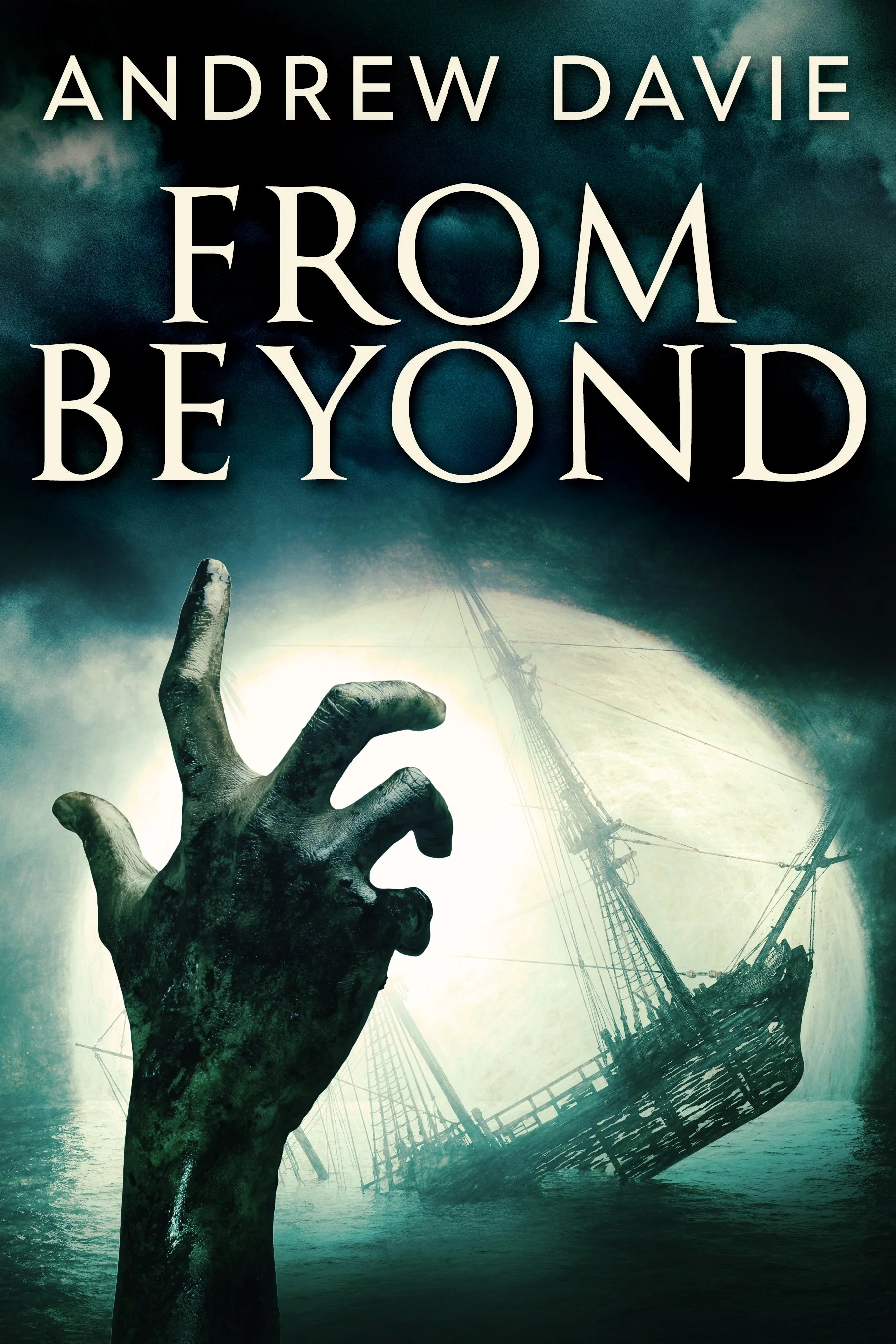From Beyond - Andrew Davie
From Beyond by Andrew Davie
Book excerpt
South China Sea, 1875, aftermath of The Second Opium or Arrow War
“Switch to chain shot!”
The command had cut through the smoke and could be heard above the wails. The sound of clanking metal then completely replaced voices as the ever-loyal crew shoved the iron orbs into the breeches and lit the cannon’s fuses. There was a brief moment of quiet, which was followed by concussive bursts that shattered the silence. They echoed from under-neath the deck and lurched the boat toward the port side. The men braced themselves for the wrath of inertia. The ship, a rugged looking merchantman named “The Ajax”, which had seen better days, buckled but maintained her composure.
Declan Malcolm watched the payload arc across the sky, followed by the faint glow of phosphorous residue, and tear into the foresail of the enemy ship. Malcolm was as thin as a reed, but his muscles were defined. He turned the wheel and felt the boat cut through the wa-ter; the veins on his arms practically burst through his skin. It took almost all of this effort to fight against the water’s current, but he was successful.
He smelled the sulfur from the cannons and barked out orders for the men to get ready to board the enemy ship once they had made contact. Saltwater sprayed his face and stung his cuts which never seemed to heal. Beneath him, the crew continued to feed the can-nons for their assault. The men would have followed Malcolm into the depths of Hades. As he thought of the fires of Hell, Malcolm reflected on the chain of events that led him here.
A famine had forced an exodus from their home in the countryside, and Malcolm’s young bride had grown deathly ill during the journey. They had weathered the epidemic for as long as it was possible and had subsisted on virtually nothing until they sought salvation elsewhere.
He and his wife boarded a train and went to London. Though they had no connec-tions, they finally found refuge, living in squalor amongst a collection of three other families. Each night Malcolm would hold his wife close to him, drag a washcloth over her forehead, and soothe her fever. It eventually got to the point where he could feel her bones protrude through her skin. She could barely speak; words would drip from her mouth in hushed tones. She was discolored, pale, and sapped of all strength. The priest had offered absolution for her, but Malcolm’s wife continued to live.
Malcolm worked nearly twenty hours a day in the slaughterhouse, collapsing the skulls of cloven-hoofed animals. He spent his time praying to a God he had trouble believing in an-ymore. The repetition without reprieve eventually eroded Malcolm’s will. Rampant disease among the cattle brought the factory to a standstill. Unable to provide for his family without a job, he soon took loans which compounded in a short duration. One night, long after the moon had risen, he was visited by the associates of his usurer.
Expertly, they worked him over and enrolled him into debtor’s prison. For six long months, he festered inside. He was able to fend off insanity along with most of the predatory advances of other inmates. Malcolm learned of his wife’s removal from their home, and her placement in a sanitarium. She still clung to life and would repeat Malcolm’s name over again while under the effects of her malaise. The priest gave Malcolm her most treasured belong-ings, including her locket, with the thought that they would bring Malcolm peace or at least revitalize his endurance. Bordering on the brink and ready to jump willingly into the abyss, ultimately, Malcolm had been rescued by a half Russian expatriate.
The gruff philosopher, Tretiak, taught Malcolm how to handle himself when words alone could no longer work. Tretiak filled Malcolm’s mind with abstract philosophies and his-tory. More importantly, he gave Malcolm focus and reminded him of his reasons to leave debtor’s prison. Malcolm’s release came in the form of the Jameson & Brixton company who, looking for cheap labor, bought his debt. The morning after he was released, he found himself aboard The Emerald as an indentured servant. They were going to head for the Orient in hopes of bringing glory to the company in the form of silks and spices.
Malcolm’s wife’s fate remained unknown to him.
The Railway Strike of 1877, Pittsburgh, PA
Ray Ridley made his way toward the saloon. Even though it was late in the evening, the sun hadn’t fully set since it was July. As he navigated through the throng of people on the sidewalk, he passed by a group of railway workers who had surrounded a brakeman who’d mentioned their wages were going to be cut yet again. Next to the brakeman was a thin fel-low in spectacles who was quite the orator. The bespectacled speaker was standing on an ap-ple box which had made him at least a foot taller than the next tallest person in the crowd.
The man talked about class disparity, specifically, the imbalance between them. He clearly had their attention, but he’d obviously studied rhetoric and knew when to lean into a long pause or slam his fist into his hand to make a point. Labor disputes were nothing new, but it seemed like strikes were now distinct possibilities as opposed to idle threats. The finan-cial panic of ’73 had triggered “The Long Depression,” which had wreaked havoc across the country.
Ridley ducked inside the saloon just as the man had finished making a point that drew applause from the crowd. Ridley could tell the orator was just getting started. While Ridley had never heard this particular speech before, he was familiar with the cadence the man had used. The man had possibly been a fire and brimstone preacher or part of a congregation be-fore he’d gotten involved with the workers.
It was only a matter of time before the workers struck in Pittsburgh. A few weeks previously, workers for the B&O had gone on strike in West Virginia; it was still happening, and there were rumors and talk of strikes happening in New York and Baltimore. While some of these strikes would be peaceful demonstrations, many would not.
South China Sea, 1875, aftermath of The Second Opium or Arrow War
The Emerald’s captain, Charles Fitzgibbons, was a runt of a man who’d earned his commission through a family connection. He was incompetent in his position of authority and made mistakes at almost every turn. Collectively, the men loathed him. Months into their voyage, Fitzgibbons developed a case of cabin fever. Somewhere around Cape Horn, he emerged from his quarters, still in his nightgown, and in his delirium shot two of the crew. Fitzgibbons claimed they were minions of Lucifer before he was subdued. The men, already weary from the journey, and suffering painful cramping from various vitamin deficiencies, decided to send Fitzgibbons to Davy Jones Locker. They received temporary relief in the form of retribution when his manacled body broke the water’s plane.
Afterward, a maelstrom erupted aboard the ship over the balance of power. Cutlasses were drawn and factions were nominated. The crew, now at the breaking point, were on the verge of complete chaos. Malcolm soon cooled them of their rage, and due to his prowess and proven capabilities in almost every regard, he was nominated for the position of the new cap-tain, much to the chagrin of the first mate. Nearly twice in height and width as Malcolm, the first mate, a hard man named O’Hanlon, challenged Malcolm to a bare-knuckle match for the captaincy and the right to the ship. O’Hanlon’s hair was dark red, the color of cinnamon, and he had a braided beard. He took his shirt off and revealed a physique that looked like Rapha-el or Donatello might have carved it. He was a sight to behold.
“He might be quick with the words, but let’s see how quick he is with these,” O’Hanlon had said.
With that, he lifted his hands: misshapen and the size of Christmas hams.
“We’re out of harm's way. No need to stir up trouble,” Malcolm said as he slowly backed from the giant.
“Let’s go,” O’Hanlon said and put his hands up in the traditional Marquis-of-Queensbury style.
Malcolm attempted to further reason with this behemoth, but to no avail. O’Hanlon had helped himself to a few servings of grog during the brief reign of chaos after the crew had dealt with Fitzgibbons, and this juggernaut would be soothed by no words. The first punch was telegraphed, and Malcolm avoided it, but even in his sorry state O’Hanlon pos-sessed the skills of an excellent pugilist.
















Praesent id libero id metus varius consectetur ac eget diam. Nulla felis nunc, consequat laoreet lacus id.